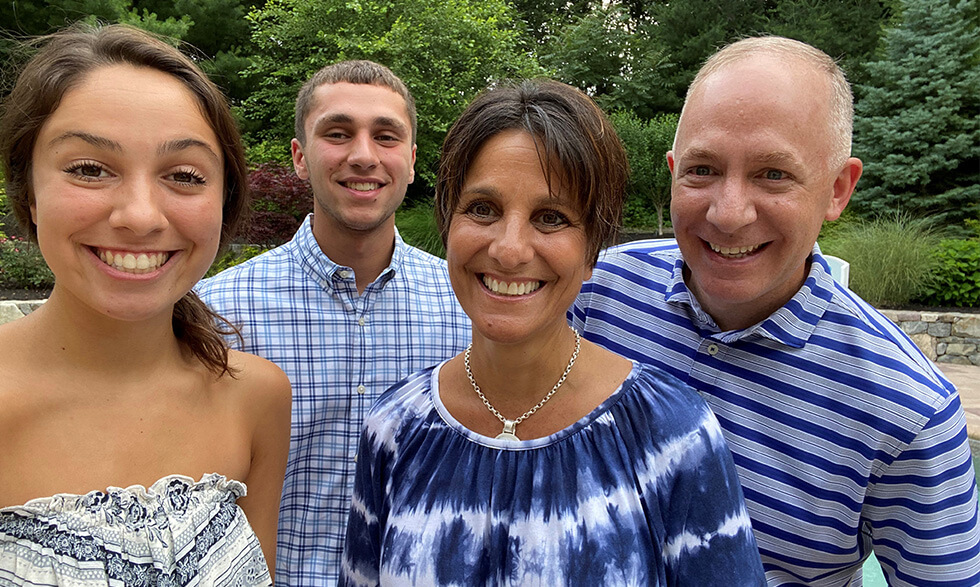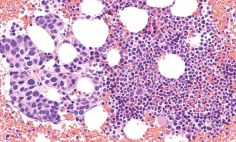Cheryll Plunkett of Medway, Massachusetts, was diagnosed with breast cancer in 2002 and diagnosed with metastatic breast cancer in 2015.
I was diagnosed in 2002, 13 months after my second child was born. I was 34. The tumor was a pretty good size, and my lymph nodes were involved. I had a mastectomy of my left breast, followed by chemotherapy and radiation. I tolerated the medicines pretty well. I had hair loss and fatigue, but no nausea or bad side effects. They told me I shouldn't have any more kids because my cancer was hormone positive, so I had a total hysterectomy to alleviate as much estrogen as possible.
For my poor husband, who was 29 at the time, imagine having a 1-year-old, a 2-year-old, and a wife with breast cancer. But he was wonderful and so was my whole amazing family, who helped with everything. I focused on having a positive attitude, working, and raising my children, and the years went by. I just assumed, pretty ignorantly, that you just get rid of this and life goes on.
"I focus on being positive. In my opinion, a positive attitude goes a long way in getting through this."
- Cheryll Plunkett
But then in 2015, I had this cough that wouldn't go away. I thought maybe it was allergies or acid reflux, but my primary care doctor did tests and couldn't find the cause. So, I reached out to my oncologist, and he said to come in for some blood tests. Then he sent me for a scan. And then—I will never forget this—he called to tell me that I had metastatic breast cancer and I didn't even understand what that meant.
My doctor put me on Ibrance, which had just been FDA [U.S. Food and Drug Administration]-approved for advanced cancer use four months earlier. Within two weeks, my cough was gone. I stayed on it for four years, until it stopped working, then switched to a slightly older drug, Afinitor. These drugs are precursors to chemotherapy. My doctor and I know Afinitor won't last four years. It's like a wet towel—at some point you just can't squeeze out any more water. The next step likely will be daily pills of chemotherapy.
I know I'm treading water, but the more time that passes, the better the chance of new drugs being developed, of living to see my kids married, even grandchildren.
It's great that there's research on finding breast cancer sooner, but we need more money and resources [going] toward helping metastatic breast cancer patients. We need [to put] more effort into finding ways to prolong life.
What Cheryll tells other patients:
Control the things you can control. That means your attitude, what you eat, getting exercise, how you live. I focus on being positive. In my opinion, a positive attitude goes a long way in getting through this. I also stay pretty active. I feel that exercising and eating well helps. For me, I eat protein, lots of greens, not a lot of junk, very little alcohol. I love bike riding and walking for exercise, although I know I probably should do more with weights for my bones.
Advocate for yourself. This is huge. Only you know your body, so tell your doctor what you're feeling, what your symptoms are, how they're affecting your life. If you feel you can't communicate your feelings clearly, take along someone who can help you. Ask your doctor a ton of questions. If you go on the internet for information, make sure it's only a well-known, reliable source. [The National Cancer Institute, Mayo Clinic, and Breast Cancer Research Foundation are some good ones.]
If you're struggling, get help. Realize that this is a long-term journey with peaks and valleys and sometimes you might need some help. I sought out a counselor, and she was amazing. She helped me learn how to deal with the elephant in the room. She gave me tools to cope and not feel overwhelmed and to learn how to live.







